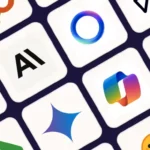The development of autonomous AI agents existed as a concept both in science-fiction and early-stage experiments for several years. We have reached the breaking point of AI agent development which turns experimental concepts into operational systems. The current advancements in artificial intelligence through OpenAI’s GPT-4 along with Google’s Gemini system and Manis AI model lead to a new technological period where AI operates as an agent rather than a helper.
NOTE: This is an official Research Paper by “CLOXLABS“
Primary Characteristics of AI Agents
& Their Boundary-Breaking Significance
AI agents function independently of constant human direction unlike generic AI tools that constantly need human assistance. An agent operates by receiving a large objective which it divides into actions it decides on independently and carries out using current data. This achievement makes a major advancement beyond either passive chatbots or system automation tools.
Manus AI stands as a new system that performs resume screening along with property research and stock analysis together with trip planning without requiring human supervision. Through its virtual browser function the tool explores the Internet to develop thorough reports by obtaining relevant insights. Virtual intelligence has now progressed beyond answer services because it functions autonomously without human command.
Why AI Agents Are Taking Off Now?
The evolution timelines of AI agents is very long, yet acceleration is due to the combination of three fundamentals:
Enhanced Language Models – GPT-4-turbo and Claude Sonnet are examples of AI models that perform significantly better than their predecessors because they can perform complex reasoning tasks with considerably reduced error ratios.
Combining Engagements – Unlike earlier AI agents, these new breed of agents can connect with APIs, databases, and even virtual web browsers. These enable agents to interact beyond text generation.
Smarter with more Integration – Modern agents are aided by better task planning algorithms, which allows them to circumvent repetitive loops, thereby making them genuinely useful in real-world applications as compared to earlier AI agents, like Baby AGI.
What Can AI Agents Do Today?
The range of applications is expanding rapidly. Here are just a few ways AI agents are being used today:
● Automated Research: Agents can browse the web, summarize key findings, and generate insights… whether it’s market trends, investment opportunities, or academic papers.
● Project Management: AI agents can coordinate schedules, manage workflows, and even delegate tasks to different software tools.
● Customer Support & Operations: Businesses are deploying AI agents for customer inquiries, troubleshooting, and even managing logistics.
● Software Development: Some AI agents can now generate, test, and deploy code, significantly speeding up the software development lifecycle.
● Personal Assistance: From planning vacations to managing emails, AI agents are making everyday tasks smoother and more efficient.
The Challenges of AI AGENTS
While the excitement around AI agents is justified, there are still major hurdles to overcome:
● Reliability Issues: AI agents are still prone to errors, misinterpretations, and sometimes hallucinations (i.e., making up information).
● Security Concerns: Giving an AI agent access to sensitive data or decision-making power requires robust security measures to prevent abuse or unintended consequences.
● Ethical and Regulatory Questions: How do we ensure AI agents act in alignment with ethical standards and legal regulations? Policymakers are still catching up to these rapidly evolving technologies.
● User Trust and Adoption: Many people still hesitate to let AI operate autonomously. Companies need to build transparency and trust in how AI agents function.

What’s Next for AI Agents?
We’re only scratching the surface of what AI agents can achieve. The next generation of AI systems is expected to:
● Have improved memory and learning capabilities, allowing them to build knowledge over time.
● Become more specialized, with domain-specific agents for legal, medical, and financial industries.
● Integrate seamlessly into real-world environments, from self-driving logistics to AI-driven business automation.
One thing is clear: AI agents are not just another tech trend—they represent a fundamental shift in how work gets done. The businesses and individuals that embrace this shift early will be the ones shaping the future.
Welcome to the AI agent era. It’s here, and it’s only getting started.CLOXMAGAZINE, founded by CLOXMEDIA in the UK in 2022, is dedicated to empowering tech developers through comprehensive coverage of technology and AI. It delivers authoritative news, industry analysis, and practical insights on emerging tools, trends, and breakthroughs, keeping its readers at the forefront of innovation.








